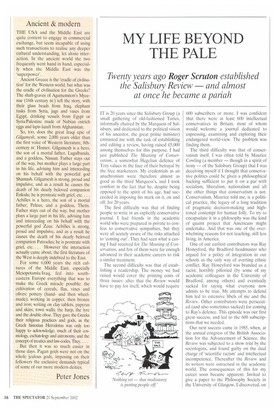Ancient & modern
THE USA and the Middle East are quite content to engage in commercial exchange, but seem incapable of using such transactions to realise any deeper cultural understanding, let alone interaction. In the ancient world the two frequently went hand in hand, especially when the Middle East was the 'superpower'.
Ancient Greece is the 'cradle of civilisation' for the Western world, but what was the cradle of civilisation for the Greeks? The shaft-graves of Agamemnon's Myeenae (16th century BC) tell the story, with their glass beads from Iraq, elephant tusks from Syria, jugs and vases from Egypt, drinking vessels from Egypt or Syria/Palestine made of Nubian ostrich eggs and lapis lazuli from Afghanistan.
So, too, does the great Iraqi epic of Gilgamesh, some 2,000 years older than the first voice of Western literature, 8thcentury BC Homer. Gilgamesh is a hero, the son of a mortal father, Lugalbanda, and a goddess, Ninsun. Father stays out of the way, but mother plays a large part in his life, advising him and interceding on his behalf with the powerful god Shamash. Gilgamesh is strong, proud and impulsive, and as a result he causes the death of his dearly beloved companion Enkidu; he is prostrate with grief, etc. . . Achilles is a hero, the son of a mortal father, Peleus, and a goddess, Thetis. Father stays out of the way, but mother plays a large part in his life, advising him and interceding on his behalf with the powerful god Zeus. Achilles is strong, proud and impulsive, and as a result he causes the death of his dearly beloved companion Patroclus; he is prostrate with grief, etc.. . . However the interaction actually came about, the first literature of the West is deeply indebted to the East.
For some 6,000 years the rich cultures of the Middle East, especially Mesopotamia/Iraq, fed into southeastern Europe everything that was to make the Greek miracle possible: the cultivation of cereals, flax, vines and olives; pottery (handand then wheelmade); working in copper, then bronze and iron; writing on clay tablets, papyrus and skins; town walls; the harp, the lyre and the double oboe. They gave the Greeks their religious practices and gods, as the Greek historian Herodotus was only too happy to acknowledge, much of their cosmology, eschatology and astronomy, and the concept of treaties and law-codes. They. . .
But then it was so much easier in those days. Pagan gods were not on the whole jealous gods, imposing on their followers the exclusive demands typical of some of our more modern deities.
Peter Jones










































































 Previous page
Previous page